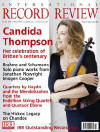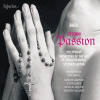Texte paru dans: / Appeared in:
*

International Record Review -
Pour
s'abonner / Subscription information
Hyperion
CDA679012

0034571179018 (ID287)
Consultez toutes les évaluations recensées pour ce cd
~~~~ Reach all the evaluations located for this CD
Passion season is here once again and with it has come a very welcome new recording of Bach’s ‘other’ Passion. Highlighting the essentially intimate and devotional character of the St John Passion as compared with the St Matthew — Stephen Layton presents an intelligently perceptive performance, beautifully sung by a fine team of soloists and by the ever-dependable Polyphony, and, in the main, superbly played by the Orchestra of the Age of Enlightenment. I am, however, disturbed by a couple of troublesomely tuned recorders which leave a sour taste in the mouth as they accompany a limpidly delicate Carolyn Sampson in the aria ‘Ich folge dir gleichfalls’.
Polyphony and Layton have been presenting the St John Passion in live performances in London for several years now, so this recorded version comes finely honed, a deep familiarity with the score not causing any hint of routine but showing itself in an easy fluency as it passes from devotional strength through the depths of pathos and anguish to high drama, the immediate aftermath of the Crucifixion creating a vividly powerful climax.
The choral singing is, as we have come to expect from any choir directed by Layton, neat and precise, the opening chorus a classic example of collective excellence, the startling cries of ‘Herr’ delivered with great exactitude but at the same time introducing an immediate note of emotional intensity. Indeed, one of the characteristics of this new recording is its sustained emotional undercurrent; a kind of tight-lipped restraint, which, far from keeping the passion at arm’s length, serves only to increase its impact and intensity. Chorales are delivered with an almost dewy-eyed quality which casts into particularly sharp focus the sense of powerless but absorbed observers to an earth-shattering chain of events.
Jan Bostridge brings to the role of Evangelist great authority and potent power, and while he might lack the purposeful directness of Mark Padmore (on the John Eliot Gardiner/Soli Deo Gloria set) or the absorbing gracefulness of Gerd Türk (Masaaki Suzuki/BIS) he is nevertheless profoundly impressive, with his vocal dexterity, marvellous purity of tone and astonishing sense of involvement achieved through placing great emphasis on the delivery of the text. In Neal Davies we have a Christus who exudes anguish but also considerable poise. His final utterance, ‘Es ist vollbracht!’ , is conveyed with a convincing combination of resignation and sorrow, beautifully sustained by Iestyn Davies as he reflects on these words in his ensuing aria.
Elsewhere, however, Davies introduces a disarmingly pleading note into his aria ‘Von den Stricken meiner Sünden’ , which might seem awkward were it not for the pair of oboes which intertwine him with the kind of gossamer delicacy but steely strength of a spider’s web. Nicholas Mulroy, assigned the tenor arias, has a very different voice from Bostridge , fuller and altogether more vibrant, but at times a little overbearing, as in the aria ‘Ach mein Sinn’ . Roderick Williams, on the other hand, exudes devotional intensity and great warmth in a beautifully paced ‘Betrachte, meine Seel’, the delicate whisperings of the OAE strings providing an extremely enticing accompaniment. With ‘Eilt, ihr angefochtnen Seelen’ he is altogether more animated and energized, his enormously characterful delivery here greatly abetted by the vivid orchestral accompaniment and the hurling interjections from the chorus — perhaps one of the most technically and musically impressive numbers in the whole performance.
This is a particularly distinctive St John Passion, notable for the excellence of the singing and, most particularly, for Bostridge’s masterly Evangelist. Layton’s reading is, above all, precisely focused and compelling, and while it is not without some flaws, it gets closer to the heart of the passion story than most and, as such, is a recording which ranks very highly indeed. The recorded sound is, as we would expect, superb and the documentation, with texts, translations and a generous and perceptive essay from Bach authority Christoph Wolff, neatly contained within a single manageable booklet.
Cliquez l'un ou l'autre
bouton pour découvrir bien d'autres critiques de CD
Click either button for many other reviews


